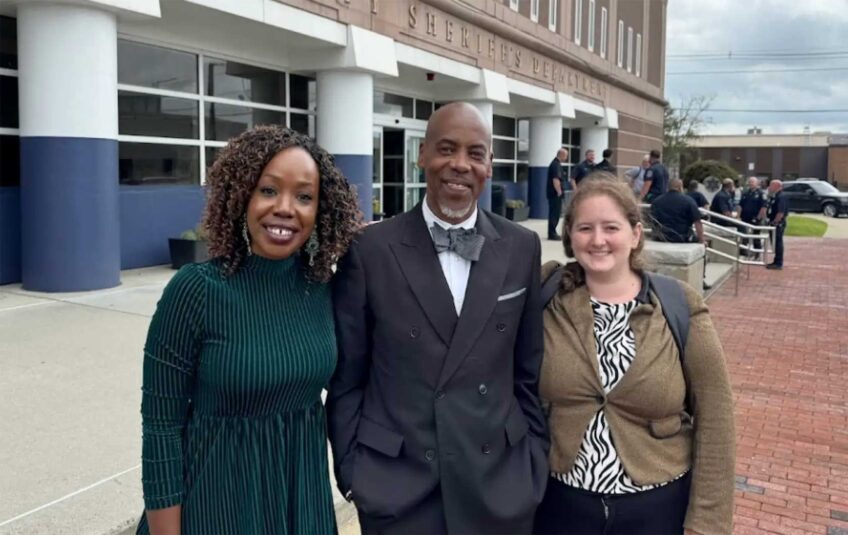When three former federal secretaries of education opined on the future of their agency, they were at times honest, critical and hopeful. Refusing to despair at calls to abolish the U.S. Department of Education, each leapt to defend it during the January webinar hosted by the Brookings Institution.
Certain that some reorganization awaits, the three also shared ideas for improving operations.
Currently, “it’s a big bank,” said Margaret Spellings, who from 2005 to 2009 served as the eighth U.S. education secretary.
She said all three former secretaries were “relentlessly focused on K-12 achievement,” yet learned that “the big bulk of the work” involved administering “very large loan and grant programs.” Those include the Free Application for Federal Student Aid and popular school funding grants like Title I for low-income students and Individuals with Disabilities Education Act (IDEA) for those with special needs.
Spellings was appointed by President George W. Bush, a Texas Republican who, with Congress, wrote the No Child Left Behind Act.
Passed in 2001, that law required annual student performance assessments, proficiency standards and parent engagement, as well as test-based school and district accountability systems. It emphasized a third-grade level benchmark.
Positing as points of consensus, “reading and math, transparency, accountability, achievement gap,” Spellings said “we can all agree on those first principles without getting distracted.”
Later, she suggested workforce development, community college and apprenticeships were another “place where we can find common cause, absolutely, with the Congress.”
For Arne Duncan, the ninth secretary of education, equity is foremost. “Tens of millions” of children “are too far behind,” he said. “Really fighting to give them an opportunity and education, theoretically, should be the pathway to upward mobility.”
Excellence and innovation follow from there.
“The U.S. Department of Education is uniquely positioned to scale what works,” Duncan said. “Show evidence of what’s going on well in real communities to close gaps, reduce dropout rates” and boost “college completion,” he recommends.
Duncan served under President Barack Obama, a Democrat from Illinois. The Obama administration challenged schools to excel, offering grants to launch a Race to the Top.
John King Jr., who served as the 10th secretary of education, wondered how the present nominee for secretary, Linda McMahon, would use the office’s “bully pulpit.” He said, “I hope it will be urgency about improving outcomes, because that is a threat to the long-term health of our economy and our democracy.” King served through the end of the Obama administration.
Between Duncan’s departure and King’s Senate confirmation, Congress passed the Every Student Succeeds Act in 2015. That law synchronized high school academic standards with those of higher education admission. It also transformed annual proficiency goals to subgroup-specific targets.
King distinguished between the “customer service side” and “funding side” of the department. Programs in the latter had “near unanimous support, both sides of the aisle.”
Yet, he acknowledged problems. On “the customer service side, the experience of so many Americans is the FAFSA and student loans.” Those interactions were “not a positive, generally, customer service experience, particularly recently.”
Last year, there were issues with a new FAFSA application King termed it the “FAFSA Debacle.”
He said, “There were so many bugs, it didn’t work, it was delayed, it was incredibly inconvenient and disruptive. That hurt.”
Miscommunication between the department and “loan service providers” resulted in the dissemination of “bad information” when people called for help. Some didn’t understand their accumulating interest. People were “resentful and angry.”
For Duncan, the context is “a lot of distrust around all our institutions: government institutions, media,” and others. “What people crave more than anything is authenticity and honesty,” he said. “The way to rebuild trust is to tell the truth.”
He advised that education leaders should “be the truth teller” of “hard truths, maybe ugly truths.” He hoped they would “hold us all accountable for getting better.”
Spellings noted that the department had not always overseen loans. “In the Bush administration and prior to that, the federal loan portfolio was essentially serviced externally in the private sector.”
“It was sold to the Congress” and brought in-house, she said. Initially, loans were pitched “as a big money maker for the department and for the U.S. government, the taxpayers of the United States.”
“In the early days it was,” Spellings recalled. Now, after a pandemic, plus forbearance and forgiveness policies, “we have a multi-hundred-billion-dollar liability.”
She expects “surgery” to excise loan programs.
Arne Duncan said the subject was “really fair” to scrutinize. However, it could sap the opportunity for positive lawmaking. If policymakers “spend a lot of time and energy and noise on moving X to Y,” he said, “it doesn’t help any kid learn to read.”
For comparison, he cited an unsuccessful effort to bring the Bureau of Indian Education into the Department of Education. The Bureau serves “the children who need the most and get the least: Native American students,” Duncan said.
“Having the Department of the Interior literally running a department of education for, arguably, our most disadvantaged children,” he said, “makes no sense whatsoever.”
“With terrible outcomes,” Spellings added.
King noted similar agency overlap with early childhood education and workforce development, among others. If reorganization wasn’t the answer, then “better coordination between agencies would be wonderfully helpful,” he said.
Spellings said that many education topics, like curriculum, books, reading lists and technology, were “governed at the state and local level.”
For federal leadership, she said, “we ought to be relentless on what are our expectations.”
Ultimately, all agreed that there was a federal role in education.
“If a great military is our best defense as a nation,” Duncan said, “a great education system is our best offense.”
Spellings posed a counterfactual where “everybody was knocking the top off of student achievement” and “there was opportunity writ large.” Without that, “it’s part of the civil rights agenda and it’s as vital today as ever.”
King emphasized the “desperate need” in analyzing and promulgating best practices, in part to understand the limits of small-scale success. Just because some practice “worked in one place doesn’t mean it’s going to scale easily,” he said.
For that, Spellings emphasized the valuable data the department collects to evaluate programs. “We only have data because the federal government says, ‘Show me what you’re doing with our money.’”






